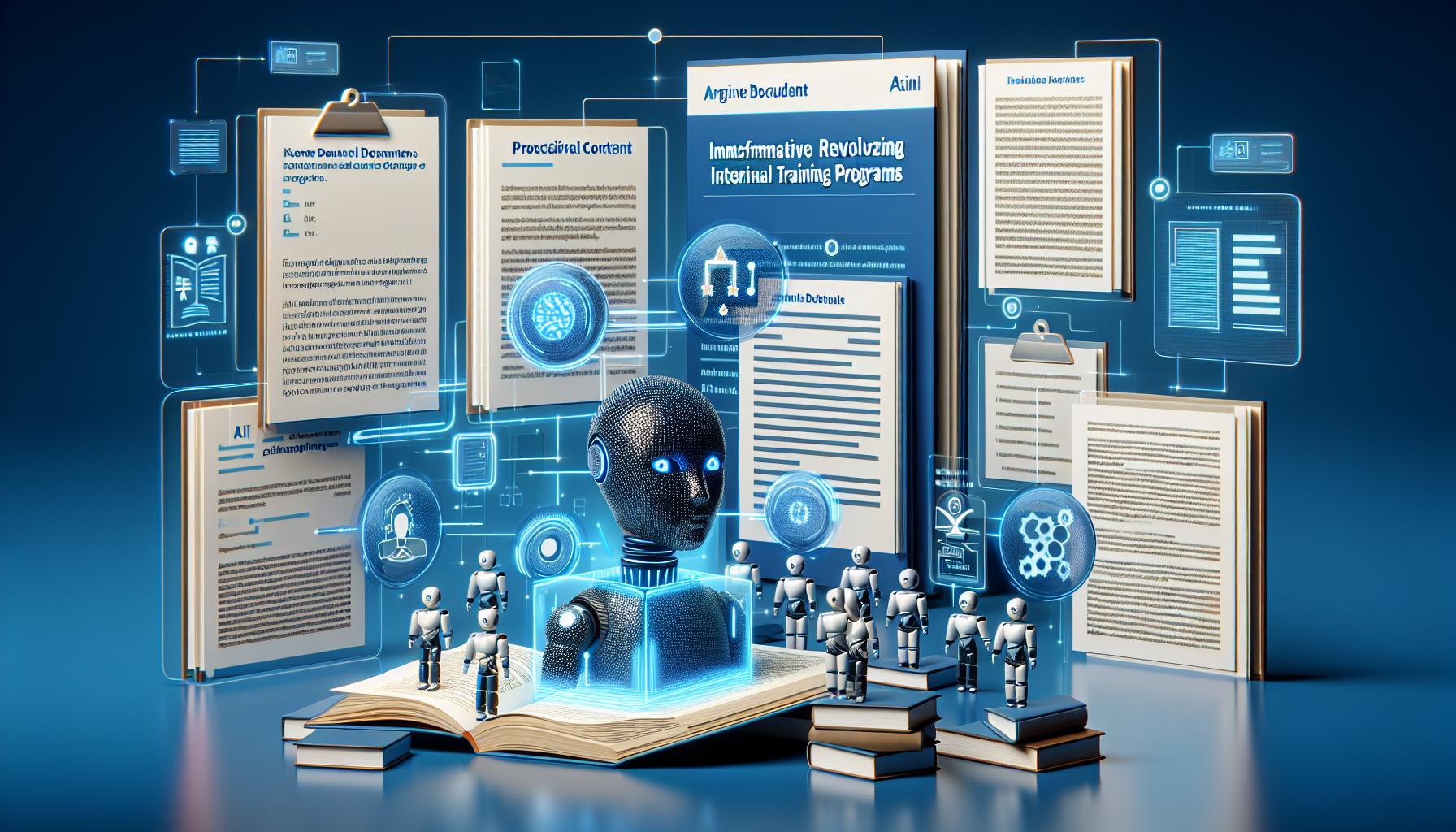AI-Driven Training Programs: Harnessing Internal Knowledge Stores

Introduction
The landscape of corporate training is evolving at a pace that matches the rapid technological advancements seen across various industries. Companies are increasingly looking for efficient ways to improve their training programs, making them more dynamic and engaging. This is where the power of Artificial Intelligence (AI) comes into play. AI has the remarkable capability to transform dormant documentation and procedural content into interactive and immersive training modules. In this article, we will explore how AI can revolutionize internal training programs by leveraging existing knowledge stores, and how various technologies and platforms facilitate this transformation.
Understanding the Power of AI in Training
Traditional training programs have often relied heavily on static documents, lengthy manuals, and unengaging presentations. While these resources may contain a wealth of information, they are often underutilized due to their lack of interactivity and accessibility. AI excels at addressing these issues by identifying critical knowledge points within large documents and converting them into various interactive training formats.
For instance, AI-driven tools can scan through extensive procedural content and pinpoint essential information. This information can then be turned into quizzes that reinforce learning, tutorials that provide step-by-step guidance, or even immersive experiences using augmented reality (AR) and virtual reality (VR) technologies.
AI-Enhanced Employee Onboarding
One significant area where AI-driven training programs can make a substantial impact is in employee onboarding. Onboarding is crucial in acclimatizing new hires to a company's culture, processes, and expectations. However, traditional methods often fall short in engaging new employees effectively.
With AI, the onboarding process can be transformed into a highly interactive and personalized experience. For example, AI can analyze the role-specific documentation and generate customized training modules that align with a new hire's specific job responsibilities. Moreover, AI can create interactive simulations that replicate real workplace scenarios, offering new employees a risk-free environment to familiarize themselves with their tasks.
Enhancing Continuous Learning
Beyond onboarding, continuous learning is essential for employee growth and adapting to ever-changing industry demands. AI-driven training programs play a crucial role here by providing ongoing, up-to-date training content tailored to individual learning paces and preferences.
AI can constantly assess an employee's performance and learning progress, adjusting the training content accordingly. For instance, if an employee struggles with particular concepts, the AI system can identify this and provide additional resources, quizzes, or tutorials to reinforce the learning. This personalized approach ensures that employees receive the right training at the right time, fostering a culture of continuous learning and improvement.
Technology Platforms Facilitating AI-Driven Training
Several platforms and technologies are at the forefront of facilitating AI-driven training programs. Companies like Coursera, Udemy, and LinkedIn Learning already use AI to personalize learning experiences. However, there are more specialized tools that focus on transforming internal knowledge stores into interactive training modules.
1. EdCast: EdCast's AI-based knowledge cloud platform helps organizations collect, organize, and distribute knowledge effortlessly. It uses AI to curate learning content and create personalized learning pathways based on individual employee needs.
2. Docebo: Docebo offers an AI-enabled learning management system (LMS) that automates content delivery, enhances learner engagement, and provides detailed performance analytics.
3. RAIA: RAIA leverages AI to convert existing documentation and procedural content into interactive training modules, facilitating a seamless transition to AI-enhanced learning environments.
Practical Insights and Real-World Examples
Navigating the shift to AI-driven training programs can be daunting, but the benefits far outweigh the challenges. Several businesses have already seen significant improvements in their training programs by integrating AI.
For instance, a large financial services company implemented an AI-driven onboarding platform that customized training modules based on the employees' roles and prior knowledge. This resulted in a 30% reduction in onboarding time and a significant increase in employee satisfaction rates.
Similarly, a technology firm utilized AI to enhance its continuous learning initiatives. By integrating AI-driven assessments and personalized learning modules, the company saw a notable increase in employee skill levels and productivity.
Conclusion
AI-driven training programs represent the future of corporate learning, offering unparalleled opportunities to enhance employee engagement, productivity, and satisfaction. By leveraging internal knowledge stores, businesses can transform static content into dynamic, interactive training modules that cater to the unique needs and preferences of their employees.
Whether it is improving onboarding experiences or fostering continuous learning, AI stands out as a powerful tool in revolutionizing the way organizations approach employee training. As technology continues to evolve, the potential for AI in training programs will only grow, paving the way for more innovative and effective learning solutions.




